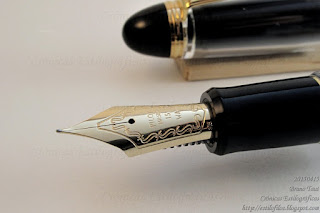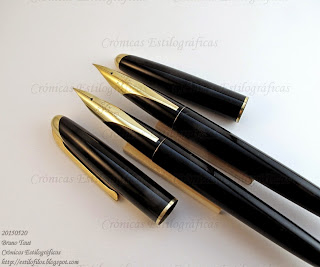Introduction:
In December of 1973, Pilot released one of the lesser known variations of the Capless line of pens. This involved a totally new nib unit, not compatible with the previous models. However, this new nib unit will be usable with so far all the later models, albeit it was bound to go through some modifications that did not alter the basic geometry.
Features:
| Codes. | CN-400BS & CN-500BS. Both codes belong to the same pen. The difference in the number obeys to the change in price made in 1981. This model is made of aluminum and black plastic, all in matte finish. |
| Original_price. | JPY 4000 (1973-1981); JPY 5000 (1981-1984). |
| Production_years. | 1973-1984 |
| Nib_unit. | Type VII. Gold 14 K and steel. |
| Filling_system | Single spare cartridge. CON-20 and CON-50 can be used. |
| Opening_system. | “Knock system” (push button). |
Dimensions:
Model CN-400BS (and CN-500BS).
| Length closed | 136 mm |
| Length open | 133 mm |
| Diameter | 12.0 mm |
| Weight | 18.3 g |
Nib unit:
Type VII, variation a. In 14 K gold and in steel. This nib unit uses single spare cartridges and converters CON-20 and CON-50. This nib unit will be implemented on the following model launched in 1984. Therefore, this nib unit is be compatible (but not identical) with subsequent models.

Nibs made of 14 K gold and of steel. This nib unit survived the pen model and was used on the following model. This explains how the steel nib on the picture displays a manufacturing date of 1989.
Additional information:
Nibs are engraved with the production place and date, but not so the bodies.
Back to the "Pilot Capless - 50 years" page.
Bruno Taut
Nakano, June 2015
etiquetas: Pilot, Capless
Nakano, June 2015
etiquetas: Pilot, Capless













































